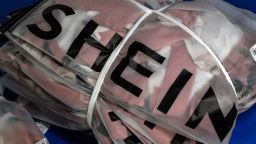A group of American fashion influencers and creators has received online backlash after they visited a model factory in China as part of a tour sponsored by Shein, an internet shopping giant, and posted glowing reviews.
Shein – which is known for selling trendy clothing at low prices – is among a number of companies founded in China now facing questions over a litany of issues, including how it’s able to sell goods so cheaply, how transparent it is with the public about its labor and sourcing practices and how much environmental waste it generates.
In mid June, the influencers traveled to the southern Chinese megacity of Guangzhou to see the company’s “innovation center,” a bright and spacious facility featuring high-tech fabric cutters and robots that transport materials.
Smiling workers were crafting clothes as the group toured the factory, with some visitors even testing out some of the tasks themselves.
Kenya Freeman, a designer who has sold clothing on Shein, traveled to China and Singapore, where Shein is now based, as part of the junket and shared videos on her Instagram account.
The pushback was swift, with comments flooding in criticizing her and the other influencers’ understanding of the company’s alleged connection to human rights abuses and the environmental impact of fast fashion. The social media users questioned why the influencers would align themselves with what they claimed were unethical values or whether the facility they visited was representative of production practices.
The amount of online hate was “unprecedented,” Freeman told CNN, and was affecting her mental health.
“I couldn’t even go on to Instagram yesterday,” said the Atlanta-based designer, adding she wasn’t defending the company nor was she responsible for its actions.
Freeman, who first worked with Shein in 2019, said the fast fashion giant was a lifeline for small businesses, especially those with founders from marginalized communities.
In a statement, Shein said the social media videos posted by the influencers were authentic.
“Shein is committed to transparency and this trip reflects one way in which we are listening to feedback, providing an opportunity to show a group of influencers how Shein works through a visit to our innovation center and enabling them to share their own insights with their followers,” it said.
Congressional scrutiny
Shein has enjoyed particular popularity with Gen Z – an age group defined by the Pew Research Center as those born after 1996 – because it heavily advertises on apps like TikTok, cultivates close relationships with influencers and keeps prices low during a period of high inflation.
But its meteoric rise has come with scrutiny amid broader environmental concerns about fast fashion and increased attention to labor practices in China, in particular as Western lawmakers have raised alarms about the alleged use of forced labor in China’s Xinjiang region, long a major global supplier of cotton.
In April, a US congressional commission said Shein, online superstore Temu and others in China were had links to forced labor within their material sourcing supply chain. It also cited reports alleging labor violations in affiliated factories as well as issues of product safety hazards and intellectual property theft.
At the heart of the concerns in Washington is whether Shein sources material from China’s northwestern region of Xinjiang. Last year, the United Nations’ highest human rights office said China committed “serious human rights violations” against Uyghur Muslim minorities in Xinjiang, which may amount to “crimes against humanity.”
China has called such claims, which include allegations of forced labor in the region,”vicious lies.”
Lawmakers initiated a bipartisan effort in May urging the Securities and Exchange Commission to require Shein to certify that their products do not contain use forced labor from the region.
The congressional commission’s April report cited a 2022 Bloomberg report that claimed clothing sold by Shein in the United States contained cotton from Xinjiang. The United States has banned all imports from the region over concerns about the use of forced labor there.
A supply chain transparency statement on Shein’s website says that it has “clear and strong policy against modern slavery, forced labor and human trafficking” and requires all suppliers and manufacturers to comply with “all applicable labor and environmental laws.”
The company also says it regularly audits its suppliers for violations including forced labor, serious environmental pollution and safety, though experts and watchdogs have called for more transparency.
In December, Shein pledged $15 million to improve standards at suppliers’ factories.
Regarding forced labor in the supply chain, the company has also said it has tested products and then stopped production and removed products from sale that contain cotton from “an unapproved region.”
Other companies have also faced scrutiny.
Alongside Shein, US lawmakers have also addressed questions to American firm Nike (NKE), German company Adidas (ADDDF) and Boston-based retailer Temu, which is owned by PDD, over the steps each has taken to ensure their products and materials aren’t produced with forced labor. PDD, which is now based in Dublin, was headquartered in Shanghai until earlier this year.
The European fast fashion retailer H&M faced backlash in China in 2021 after it said it would not source cotton from the Xinjiang region.
Addressing “rumors”?
Dani Carbonari, a plus size influencer and model who visited Guangzhou, sought to explain in a Monday Instagram post why she joined. She said she joined the trip in order to address “rumors” plaguing the company.
She has deleted a previous Instagram post in which she had said Shein was “fighting with all of their power to not only show us the truth but continue to improve and be the best they can possibly be.”
Posts from other influencers on the trip contained similar language. Some said they spoke to workers at the factory and that they were impressed by the conditions.
“I expected this facility to be so filled with people just slaving away but I was actually pleasantly surprised that a lot of these things were robotic,” Destene Sudduth, who has 384,000 followers on Instagram, said in her video.
Shein has faced scrutiny for its sustainability practices. Around 85% of clothing ends up in landfills or is burned, according to the United Nations Environment Programme. Experts say cheap, low quality fashion only exacerbates the problem.
Shein says its business model enables it to reduce waste and overproduction by producing small batches. It says it only commissions bigger batches from factories in its supply chain if demand is demonstrated. The company has set a goal of reducing emissions by 25% by 2030, based on 2021 figures.
Kelly Kellen, associate professor of marketing at Aurora University, said that even though influencers are at top of mind for marketing to Gen Z, they still need and want transparency.
“Gen Z is peeling back the onion, and they’re saying ‘What’s the purpose of this brand?’” she said.
This story has been updated with additional information.
CNN’s Michelle Toh and Nathaniel Meyersohn contributed to this report.









